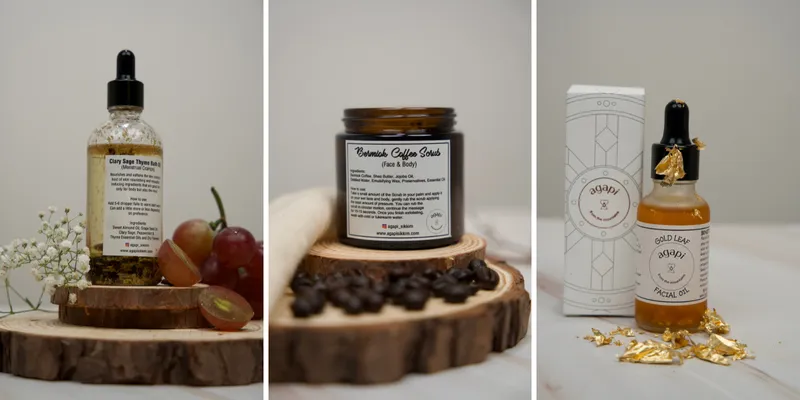This Sikkim woman entrepreneur’s sustainable skincare brand is empowering tribal women
Rinzing Choden Bhutia is the founder of organic and handcrafted skincare line Agapi Sikkim. The brand also trains tribal women to make handcrafted soaps and start their own businesses.
After corporate stints in America Online and Asti Electronics, and going the entrepreneurial route by joining her aunt in her landscaping business, Rinzing Choden Bhutia decided to return to her native state, Sikkim, in 2012.
The move was compelled in part by Delhi’s pollution, lack of availability of space, and the desire to raise her children in her and her husband’s home environs. A few years passed by and when Bhutia’s two children started school, the itch to do ‘something’ became too strong to ignore.
“My husband and I decided to stay in his ancestral property and build a farm stay around it in Kabi, North Sikkim, which is now known as Agapi Farm. We were building wooden cottages around the property when a casual conversation on avoiding plastic led to the idea of making it a sustainable farm stay,” Bhutia tells HerStory.
Bhutia had earlier attended Petrichor, a vegan retreat offered by a couple in Gorubathan in West Bengal, where she had taken up a short course on making handcrafted soaps. This, she thought, would be her first step towards making the farm stay a sustainable one. Bhutia began making handcrafted soaps from her kitchen, but soon Covid-19 hit, and construction work on Agapi farm got stalled.
“I continued making the soaps as I had ample time to do research into different organic ingredients and understand more about soap making. Unlike other soap makers, I wanted to tap into the vast pool of medicinal and heritage plants available in Sikkim for centuries,” she says. This also formed the genesis for her brand, Agapi Sikkim, which offers a wide range of skincare products and solutions.
The ‘hero’ ingredient

So, instead of procuring the “hero material” from manufacturers or outside the state, Bhutia decided to tap into what was available around her, mostly local plants.
Tite Pati or mugwort, an invasive variety of weed, is claimed to have a wide variety of benefits ranging from relieving stress, as an antiseptic, helping in digestion, and known for its anti-inflammatory properties and as an anti-oxidant. There were also the other ubiquitous ingredients like turmeric and aloe vera that grew in plenty.
Once the pandemic abated, Bhutia got an opportunity to work with the Skill Development and Capacity Building Department in Sikkim to train 21 women in the village on how to make handcrafted soaps and skincare products.
Now, Agapi Sikkim was not just an entrepreneurial project, it had taken on a social angle, one that continues even today.
“When I started training the women, I realised that they were mostly from the tribal community who didn’t have the opportunity to go to school or earn a livelihood. They were completely dependent on their husbands, just doing household chores,” she says.
The group, Bhutia adds, became a safe haven for them to just leave their homes, and being the company of other women, share their problems and desires, and just be themselves for a certain period of time in a day.
After the three-month training period, 10 women decided to form a self-help group (SHG) to make handcrafted soaps. Over a two-year period, Bhutia has trained over 400 women and continues on the mission of empowering the tribal communities around her.
Meanwhile, Agapi was also taking baby steps forward. Bhutia underwent an online course in skincare from Formula Botanica, an organic cosmetic formulation school in the UK. This emboldened her to start manufacturing skincare products like creams and lotions. All the products made by the team are certified by a lab after testing. During this time, Bhutia’s friend Varsha Shreshta also joined as co-founder.
Brand expansion and plans
Agapi was incorporated as a company in 2022.
Initially, she started manufacturing products in small batches and supplied them to hotels like the JW Mariott and the Taj Group of Hotels. Other sales happened through word-of-mouth and largely through Instagram. Currently, the products are available on their own website, agapisikkim.com; Brown Living; Eco Sattva—all sustainability-focused marketplaces and on MyStore, a government portal.
It has 48 SKUs and Bhutia says its bestseller is the Gold Facial Oil that sells for Rs 2,000. While it’s placed in the premium product segment, she believes Agapi is available for far less than other brands in the same category.
Until very recently, she used her own savings to build the brand. But with a Rs 60 lakh fund infusion from prominent local figures in Sikkim, luminaries from major venture capital firms, and global impact investors, including Japan-based Arun Seed and Ahaana Ventures, along with the contribution of Alsisar Impact, the brand is all set to scale. The brand is now valued at $1 million. Agapi also became the first women-led startup in Sikkim to attract foreign direct investment (FDI).
Bhutia also points out the role of Alsisar Impact, a market-leader, in catalysing entrepreneurship across the Himalayas and hinterlands of India.
“Anuj (Sharma) of Alsisar Impact has been working with other startups in the Northeast and being an incubatee will help us expand with the right ideas and vision to take Agapi forward,” she says.
The USP of Agapi, Bhutia emphasises, will be the continued focus on Himalayan ingredients because they offer immense potential in skincare and are available locally. For example, she says avocadoes are available in plenty, and so are oranges during the season.
“And along with the business, I will continue to reach out to women from different corners of Sikkim, and not just teach them how to make products but also equip them with marketing, packaging and distribution skills. Now, they mostly sell through government channels like fairs and exhibitions, and I’m hoping that they can expand sales through other avenues too,” she adds.
Edited by Megha Reddy







